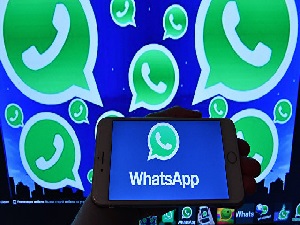



Date:02/08/18
 WhatsApp is launching new pay-to-use tools for businesses to communicate with their customers.
WhatsApp is launching new pay-to-use tools for businesses to communicate with their customers.
The move will allow its owner, Facebook, to make money from WhatsApp, which has lacked a revenue stream since dropping subscription fees.
Companies will be able to provide information and services, such as delivery dates or boarding passes, to customers via the platform.
In return, the businesses will pay a fee for a confirmed delivery.
The messages are set to cost between 0.5 cents to 9 cents (0.3p to 7p) a message depending on the country the user is based in. They can be automated or provided by human customer assistants.
The price means they will often be more expensive to use than more basic SMS-based texts.
In addition, firms can respond to questions and comments for free if they do so quickly, but if they take more than 24 hours to reply, they will face a charge.
Like other messages sent via the platform, correspondence sent via the WhatsApp Business API will be encrypted, meaning the tech firm will not be able to read the contents itself.
However, the Wall Street Journal reported that companies would be allowed to store copies of the messages elsewhere in a decrypted state.
Transport company Uber, the online store Wish and travel service Booking.com are among the first companies to adopt the new facilities.
Facebook paid $19bn to buy WhatsApp in 2014 and there has long been speculation about how Facebook intended to make money from it.
The move comes three months after WhatsApp's former boss Jan Koum announced he was quitting the service he had co-founded.
WhatsApp starts charging business users
 WhatsApp is launching new pay-to-use tools for businesses to communicate with their customers.
WhatsApp is launching new pay-to-use tools for businesses to communicate with their customers.The move will allow its owner, Facebook, to make money from WhatsApp, which has lacked a revenue stream since dropping subscription fees.
Companies will be able to provide information and services, such as delivery dates or boarding passes, to customers via the platform.
In return, the businesses will pay a fee for a confirmed delivery.
The messages are set to cost between 0.5 cents to 9 cents (0.3p to 7p) a message depending on the country the user is based in. They can be automated or provided by human customer assistants.
The price means they will often be more expensive to use than more basic SMS-based texts.
In addition, firms can respond to questions and comments for free if they do so quickly, but if they take more than 24 hours to reply, they will face a charge.
Like other messages sent via the platform, correspondence sent via the WhatsApp Business API will be encrypted, meaning the tech firm will not be able to read the contents itself.
However, the Wall Street Journal reported that companies would be allowed to store copies of the messages elsewhere in a decrypted state.
Transport company Uber, the online store Wish and travel service Booking.com are among the first companies to adopt the new facilities.
Facebook paid $19bn to buy WhatsApp in 2014 and there has long been speculation about how Facebook intended to make money from it.
The move comes three months after WhatsApp's former boss Jan Koum announced he was quitting the service he had co-founded.
Views: 1204
©ictnews.az. All rights reserved.Similar news
- 24% of U.S. Adults have made phone calls on the Internet
- UNESCO puts sustainable learning online
- Australia gives incentives for the use of telehealth
- US launches computer programme for poor kids
- UN declares web access as human right
- Facebook growth slows in stalkerbase heartlands
- One Third of Millionaires Use Social Media
- Facebook Seeks Bigger Role in Software for Mobile Apps
- Icann increases web domain suffixes
- IBM launches new social networking platform for enterprises
- Google Notches One Billion Unique Visitors Per Month
- Internet providers cut international channel renting costs by 60%
- Azerbaijan launches standard time on internet
- Icann launches facility to ease DNSSec adoption
- Social network data mining yields worrying results for traditional media





















